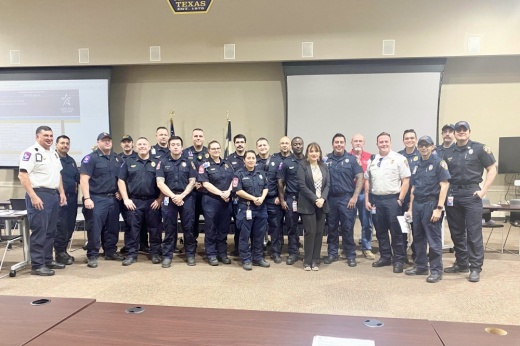Dalia Sherif, LSCS executive dean of baccalaureate programs and partnerships, said this is the college system’s first time launching two coordinated associate and bachelor’s degrees at the same time.
“When we launched the first three bachelors, we had associates in place already that fed into them,” she said. “This time, we have an associate and a bachelor’s in the same discipline starting together at the same time, which reflects the community's need for more emergency managers.”
Sherif said in an interview that the associate degree has more hands-on elements.
“There are more practical scenarios that will put students on the fast track to an in-demand career,” she said. “The bachelor’s degree is more focused on the critical leadership and communication skills for effective emergency management, as well as mastering the strategic and analytical skills necessary for future emergency leaders in times of crisis.”
Laura Gehrig is the new lead faculty for the emergency management bachelor’s degree program, the fourth bachelor’s degree to be offered by LSCS. Gehrig served in the Air Force for 21 years before becoming an emergency manager for Texas. She is also a volunteer firefighter, hazmat technician and former EMT.
Gehrig said overarching leadership is the goal of the bachelor’s program.
“We want graduates to be the leaders of all these diverse kinds of responders, including the traditional fire, police and EMS but also the integration with health care and public works,” she said. “A strong leader with a balance of management skills is really necessary in order to not let your head get sunk into what is going on and instead stay in charge of the response versus reacting to the incident.”
Sherif said 30 students are enrolled in the EMS bachelor’s program as of the fall 2022 semester.
The bachelor’s degree program is offered at the LSC-North Harris campus and also offered fully online with live lectures.
The bachelor’s program includes classes on hazard mitigation and preparedness, risk and crisis communications, disaster response and recovery, infrastructure systems and disaster, leadership and emergency management planning.
Gehrig said the need for emergency management professionals has skyrocketed since the COVID-19 pandemic.
“People saw emergency managers on the television and working in their communities more so than they have seen before,” she said. “People are more aware, so it’s an exciting time for our students to be where they’re at.”
Sherif said a capital project is underway to construct the Center for Emergency Management Programs at the LSC-North Harris campus, located at 2700 W. W. Thorne Drive in Houston. She said the building is expected to be open to students in July. The center will include a simulation area for students to practice emergency response scenarios outside of the classroom.
Sherif said the Bachelor of Applied Science in emergency management will welcome its second cohort of 60 students in spring 2023.
LSCS is approved for five bachelor programs. Four-year programs offered as of December include Bachelor of Science in nursing; Bachelor of Applied Technology in cybersecurity; Bachelor of Applied Science in energy, manufacturing and trades management; and Bachelor of Applied Science in emergency management. The college system is able to offer bachelor's degree programs following Senate Bill 2118 signed in 2017 to allow the Texas Higher Education Coordinating Board to authorize certain public junior colleges to offer bachelor’s programs, Community Impact previously reported.
Sherif said ideas for the fifth bachelor’s program are under discussion.





